Metaverse in Automotive Market Insights, 2032
The global metaverse in automotive market size was valued at $2.2 billion in 2022, and is projected to reach $27.2 billion by 2032, growing at a CAGR of 29.9% from 2023 to 2032.
Report Key Highlighters:
- The metaverse in automotive market study covers 14 countries. The research includes regional and segment analysis of each country in terms of value ($million) for the projected period 2023-2032.
- The study integrated high-quality data, professional opinions and analysis, and critical independent perspectives. The research approach is intended to provide a balanced view of global markets and to assist stakeholders in making educated decisions in order to achieve their most ambitious growth objectives.
- Over 3,700 product literature, annual reports, industry statements, and other comparable materials from major industry participants were reviewed to gain a better understanding of the market.
- The market share of metaverse for automotive industry is moderately consolidated, with several players including Microsoft Corporation, NVIDIA Corporation, Roblox Corporation, Unity Technologies, Stradvision, Eccentric, Wayray AG, holoride GmbH, Varjo Technologies, and metadome.ai (Formerly Adloid) as the major companies operating in the market.
The metaverse in automotive market refers to the integration of various immersive technologies such as virtual reality (VR), augmented reality (AR), and mixed reality (MR) into the automobile ecosystem. This integration allows users to engage with, customize, and experience vehicles, services, and various automotive-related activities through virtual representations and digital environments.
Previously, vehicle maintenance and repairs have frequently been difficult, lengthy procedures requiring actual presence at service facilities and dependence on technical knowledge. However, the metaverse offers an innovative approach to transform this area of the auto company operations.
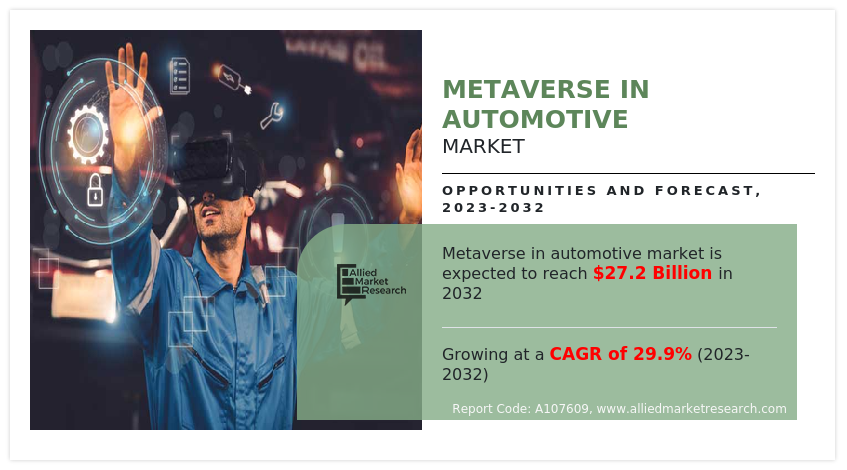
The metaverse in automotive market is segmented into Product, Technology and Application.
Automotive businesses have an opportunity to develop immersive and engaging platforms that offer virtual assistance to car owners for maintenance and repairs through the metaverse. Users have access to interactive visual instructions, step-by-step tutorials, and even real-time collaboration with virtual technicians. This method has many benefits, including immediate support, visual demonstrations, remote assistance, and cost effectiveness.
Furthermore, Augmented Reality (AR), Virtual Reality (VR), and Mixed Reality (MR) are anticipated to find increasing applications within the automotive infotainment sector in the near future. Original Equipment Manufacturers (OEMs) are already engaging in partnerships and developments to introduce AR/VR-based infotainment using metaverse technology. For instance, in March 2022, Audi teamed up with startup Holoride, aiming to bring VR-based in-car entertainment to Audi vehicles. Passengers seated in the back can enjoy immersive VR experiences through VR glasses, synchronized with the car's actual driving motions.
Factors such as rise in focus on leveraging the metaverse for marketing campaigns, increase in demand for modern vehicle shopping experiences with immersive virtual showrooms, and growth in demand for intuitive metaverse design for product development and manufacturing drives the growth of the market across the globe. In addition, factors such as cost associated with installing and maintaining premium components and issues related to cybersecurity and privacy act as a barrier for the growth of the market across the globe. However, the factors such as car maintenance and repairs by metaverse and incorporation of metaverse in automotive infotainment creates ample opportunities for the growth of the market during the forecast period.
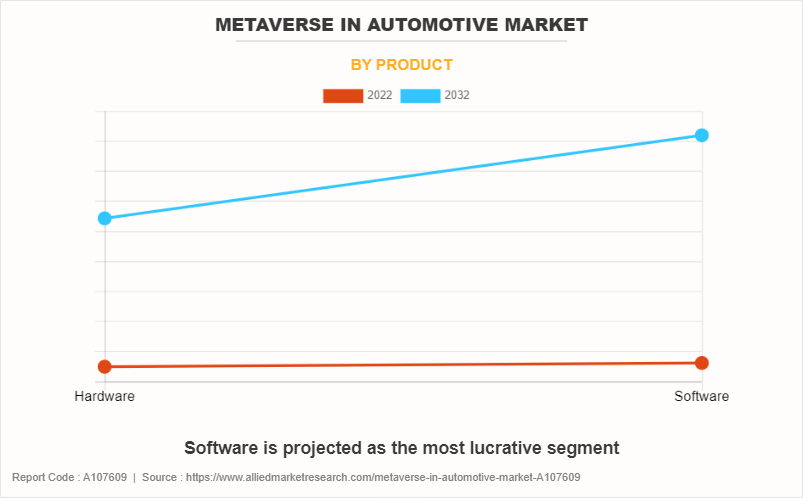
The global metaverse in automotive market has been segmented on the basis of product, technology, application, and region. Based on the product, the global market has been segmented into hardware and software. As per technology, the global metaverse market for automotive industry has been segmented into virtual reality, augmented reality, mixed reality, non-fungible token (NFT), and blockchain. Depending on application, the global metaverse for automotive industry has been segmented into simulation, testing and designing, advertising, online car purchasing, in-car entertainment, and others. Region wise, the global market has been studied across North America, Europe, Asia-Pacific and LAMEA.
Asia-Pacific holds a prominent share in the market. The Asia-Pacific region is a center of technological innovation, including advances in car technology. Moreover, with growing sales of passenger cars and growing digitization in automotives, adoption of AR based advanced displays is projected to boost the demand for metaverse in automotive market.
Chinese investors are focusing on AR and its automotive application by investment in startup working on similar ideas. For instance, in May 2023, Raythink, a company specializing in augmented reality (AR) powered heads-up displays (HUD) for in-vehicle navigation, secured approximately $15 million in a Series A+ funding round. This funding will enable the company to accelerate the mass production of its AR HUD technology. Chengwei Capital invested in Raythink in order to expand the optical and augmented reality display business in China. This investment reflects the growing interest in AR solutions for automotive applications and the potential for enhancing in-vehicle navigation experiences.
Furthermore, AR displays embedded within vehicles overlap information like navigation prompts, safety alerts, and points of interest onto the driver's view. The development of heads-up displays increasing and new products unveiled in the market. For instance, in June 2023, Raythink, a Chinese manufacturer of augmented reality heads-up displays (AR-HUD), introduced an innovative automotive solution. This solution utilizes the OpticalCore picture generation unit of company, capable of projecting fully-visible 3D images. Through its advanced photorealistic technologies, the solution offers drivers immersive and detailed 3D effects for an enhanced driving experience.
Mixed reality offers a unique and engaging user experience by overlaying digital information onto the real world. This technology can be leveraged for interactive displays, navigation assistance, and entertainment applications within vehicles. MR can provide drivers with real-time information about their surroundings, including navigation cues, hazard warnings, and traffic updates, enhancing road safety and reducing distractions. In addition, MR can revolutionize navigation by projecting directions and route information directly onto the windshield, improving drivers' spatial awareness and reducing the need to look away from the road.
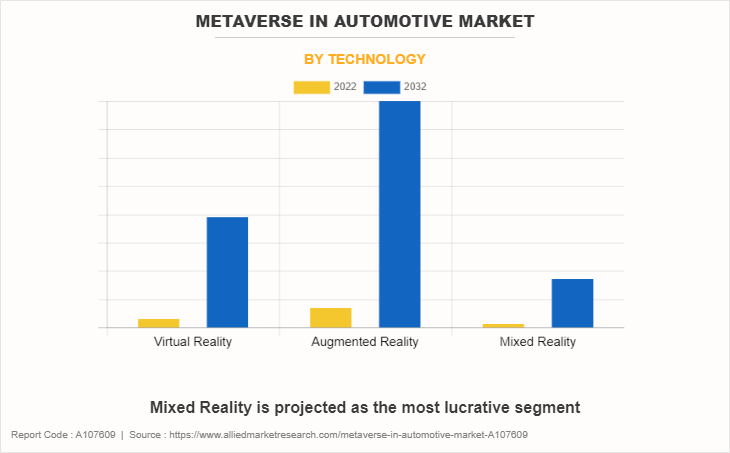
Key Developments
The leading companies are adopting strategies such as collaboration, agreement, partnership, and product launches to strengthen their market position.
- In May 2023, Microsoft partnered with Volkswagen to enable HoloLens to function in cars, addressing challenges related to moving environments affecting the headset's sensors. The collaboration resulted in a "moving platform" feature for HoloLens 2, allowing the augmented reality headset to work effectively in dynamic settings like vehicles. Volkswagen has been exploring the use of HoloLens as a heads-up display in its cars.
- In January 2023, Metadome.ai, a pioneer in immersive 3D and XR technology, for cloud-based photorealistic experiences, announced partnership with MG Motor, a renowned global automotive brand, to revolutionize customer interactions across various platforms such as web, app, and in-store. The partnership will introduce the MGVerse, an innovative web-based photorealistic Metaverse. This MGVerse will encompass a dynamic virtual arena, an avatar zone, and a creator zone featuring a multi-car showroom with a 3D car configurator, along with the chance to engage in virtual test drives.
- In December 2022, Metadome.ai partnered with Mahindra & Mahindra, a prominent Indian automotive manufacturer, to launch XUV400verse, a metaverse platform powered by Metadome.ai. It is designed for All-Electric XUV400 model in the virtual realm. This innovative platform will provide unique features such as a Virtual Brand Showroom, customizable avatars, hyper-realistic 3D car customization, and the option for a virtual test drive.
- In December 2022, NVIDIA partnered with BMW Group to deploy the NVIDIA Omniverse platform globally. This move integrates industrial AI into its production network as part of its digital transformation efforts. The partnership extends the use of the Omniverse platform for creating and managing industrial metaverse applications across BMW's production network worldwide, including its upcoming electric vehicle plant in Hungary.
- In February 2022, Eccentric partnered with MG Motor India to introduce an innovative online car consultation platform called eXpert. Leveraging augmented reality, this platform provides customers with a digital showroom experience, including real-time assistance from customer service representatives, enhancing accessibility and convenience.
- In January 2022, Qualcomm Technologies announced partnerships with Microsoft, Volvo Cars, and Renault Group at the 2022 Consumer Electronics Show (CES) to enhance digitalization. In partnership with Microsoft, Qualcomm aims to accelerate the adoption of augmented reality (AR) in both consumer and enterprise sectors, further boosting the digital experience.
- In September 2021, Roblox Corporation partnered with Hyundai Motor Company to launch "Hyundai Mobility Adventure" on its platform. It offers a metaverse platform showcasing advanced products and future mobility solutions of Hyundai Motor Company.
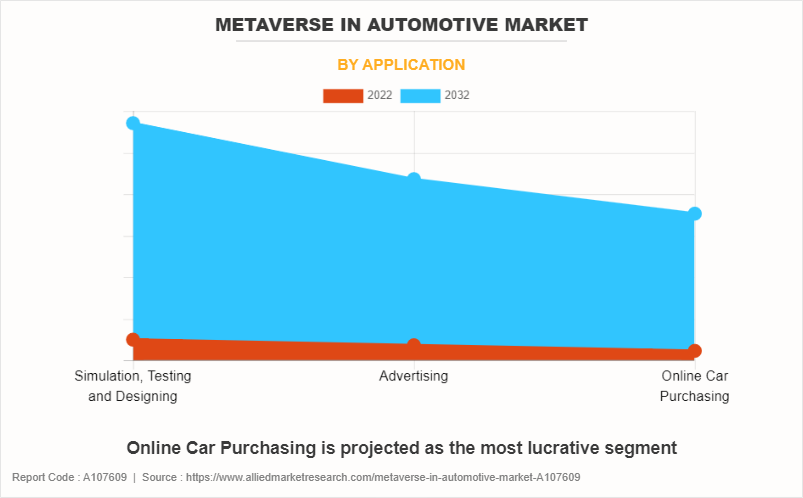
Surge in focus on leveraging the metaverse for marketing campaigns
The automotive industry is witnessing a significant rise in the utilization of the Metaverse for innovative marketing campaigns. As consumers become more digitally savvy, traditional advertising approaches are evolving. Leveraging the Metaverse allows automotive companies to create interactive and immersive marketing campaigns that engage customers on a deeper level. By blending real-world experiences with virtual elements, such campaigns attract attention, enhance brand visibility, and establish strong emotional connections with the audience. For instance, in July 2022, Nissan ventured into the Metaverse to promote its all-electric vehicle, the Ariya, with an AR visualization. In addition, in October 2021 Nissan announced a $1.2 billion investment in extended reality (XR) solutions, enhancing its Intelligent Factory Initiative for industry 4.0, incorporating XR, AI, and IoT support.
Moreover, in July 2021, Mindshare India pioneered the launch of electric vehicle (EV) by Volvo Cars, Volvoverse, in the metaverse, showcasing the Volvo XC40 Recharge in a virtual world. This collaboration marks a unique effort across WPP India agencies. These tactics make use of the immersive features of Metaverse to increase brand recognition and loyalty. The increased attention on this topic reflects the realization by automotive industry that using only traditional marketing channels may not be sufficient to engage today's tech-savvy consumers and that the Metaverse presents new possibilities for campaigns that are creative, memorable, and effective.
Increase in demand for modern vehicle shopping experiences with immersive virtual showrooms
Modern consumers seek convenience and personalized experiences, even in the automotive sector. The demand for immersive virtual showrooms is rising as customers desire to explore and interact with vehicles in a dynamic digital environment. These showrooms enable potential buyers to virtually customize, inspect, and even test drive vehicles before making a purchase decision. This trend aligns with the shift toward digital-first approaches, allowing automotive companies to provide an engaging, 24/7 vehicle shopping experience that caters to the preferences of tech-savvy consumers.
With the digital landscape shaping consumer preferences, the automotive sector is embracing immersive virtual showrooms to meet the increasing demand for modern vehicle shopping experiences. Customers can inspect details, experiment with customizations, and even take simulated test drives. For instance, in February 2023, Fiat and Kia offered customers the ability to explore vehicles through ChatGPT-integrated digital showrooms in the metaverse, aiming to revolutionize the car-buying experience. The Fiat Metaverse Store, developed in partnership with Microsoft and Touchcast, was introduced at the 2023 Consumer Electronics Show. In additional, Kia Germany introduced a metaverse dealership powered by Engage, a metaverse platform for business. This trend reflects a realization that consumers want to explore their options thoroughly before committing to a purchase, and they value the flexibility of doing so on their terms. By investing in immersive virtual showrooms, automotive companies tap into the convenience of online shopping while delivering an engaging and informative experience that bridges the gap between physical and digital interactions.
Cost associated with installing and maintaining premium components
As the automotive industry embraces the integration of the Metaverse, a significant restraint arises in the form of costs associated with installing and maintaining premium components required for metaverse-enabled experiences. The technology required to create immersive virtual showrooms, interactive infotainment systems, and real-time connectivity is often advanced and sophisticated. These premium components encompass high-resolution displays, sensory interfaces, augmented reality (AR) and virtual reality (VR) hardware, and complex software systems.
The cost of integrating such components into vehicles can be substantial, potentially increasing the overall manufacturing expenses. Additionally, ensuring that these components are of high quality and durability to withstand the rigors of the automotive environment may require further investment.
The financial implications extend beyond initial installation. Maintaining these premium components over the vehicle's lifespan can also pose a challenge. Technical upgrades, software updates, and hardware maintenance are crucial to ensure seamless and secure metaverse experiences. However, these ongoing costs could impact the overall ownership costs for both manufacturers and consumers.
Car maintenance and repairs by metaverse
Traditionally, vehicle maintenance and repairs have often been complex and time-consuming processes, requiring physical presence at service centres and reliance on technical expertise. However, the Metaverse presents an innovative solution to revolutionize this aspect of the automotive industry.
Through the Metaverse, automotive companies have the opportunity to create immersive and interactive platforms that provide vehicle owners with virtual guidance for maintenance tasks and repairs. Users can access step-by-step tutorials, interactive visual guides, and even collaborate with virtual technicians in real time. This approach offers several advantages such as remote assistance, visual demonstrations, cost efficiency, and immediate support. U.S. based automobile retailers started using metaverse for providing services and repair works. For instance, in April 20, 2022, NAPA, the American automotive retailers' cooperative, has submitted a trademark application for its logo, indicating its intentions to venture into the metaverse and incorporate non-fungible tokens (NFTs). The application outlines plan to offer virtual vehicles, NFTs, online and virtual reality-based retail store services, online motor vehicle repair services, and facilitating vehicle service and repair within virtual environments. The integration of the Metaverse into car maintenance and repairs aligns with the automotive industry's increasing focus on customer experience and convenience. This opportunity reflects a fundamental shift toward empowering vehicle owners with knowledge and resources to maintain and repair their vehicles more efficiently. As the Metaverse evolves, automotive companies can seize this opportunity to offer a more customer-centric, technologically advanced approach to vehicle maintenance and repairs.
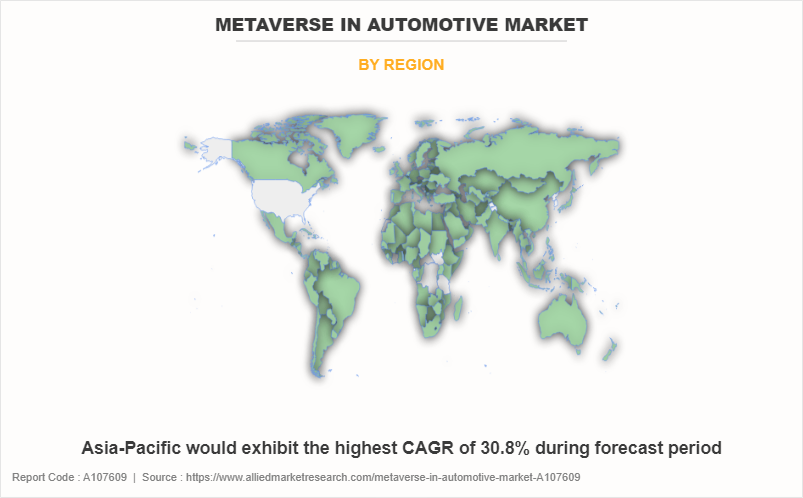
Impact of Russia-Ukraine war
- The ongoing Russia-Ukraine war has had a notable impact on the metaverse in automotive market, particularly in Europe. The tensions and disruptions caused by the conflict have led to significant consequences for the industry.
- Geopolitical conflicts may create economic uncertainty, impacting consumer confidence and spending patterns. If the Russia-Ukraine war escalates or leads to broader geopolitical instability, it may potentially affect consumer purchasing decisions in the automotive market.
- To mitigate potential risks and navigate challenges, businesses in the automotive and metaverse sectors should closely monitor geopolitical developments, diversify supply chains where possible, and maintain agility in adapting to changing market conditions. Thus, European countries have difficulties managing resources for manufacturing of automobile.
Key Benefits For Stakeholders
- This report provides a quantitative analysis of the market segments, current trends, estimations, and dynamics of the metaverse in automotive market analysis from 2022 to 2032 to identify the prevailing metaverse in automotive market opportunities.
- The market research is offered along with information related to key drivers, restraints, and opportunities.
- Porter's five forces analysis highlights the potency of buyers and suppliers to enable stakeholders make profit-oriented business decisions and strengthen their supplier-buyer network.
- In-depth analysis of the metaverse in automotive market segmentation assists to determine the prevailing market opportunities.
- Major countries in each region are mapped according to their revenue contribution to the global market.
- Market player positioning facilitates benchmarking and provides a clear understanding of the present position of the market players.
- The report includes the analysis of the regional as well as global metaverse in automotive market trends, key players, market segments, application areas, and market growth strategies.
Metaverse in Automotive Market Report Highlights
| Aspects | Details |
| Market Size By 2032 | USD 27.2 billion |
| Growth Rate | CAGR of 29.9% |
| Forecast period | 2022 - 2032 |
| Report Pages | 245 |
| By Product |
|
| By Technology |
|
| By Application |
|
| By Region |
|
| Key Market Players | Eccentric, Varjo Technologies, Unity Technologies, NVIDIA Corporation, Stradvision, Microsoft Corporation, metadome.ai (Formerly Adloid), Roblox Corporation, holoride GmbH, WayRay AG |
The global metaverse in automotive market was valued at $2,180.9 million in 2022, and is projected to reach $27,182.1 million by 2032.
Incorporation of metaverse in automotive infotainment and surge in focus on leveraging the metaverse for marketing campaigns are the upcoming trends of Metaverse in Automotive Market
Simulation, Testing and Designing is the leading application of Metaverse in Automotive Market
Europe is the largest regional market for Metaverse in Automotive
The key players profiled in the global metaverse in automotive market include Microsoft Corporation, NVIDIA Corporation, Roblox Corporation, Unity Technologies, Stradvision, Eccentric, Wayray AG, holoride GmbH, Varjo Technologies, and metadome.ai (Formerly Adloid)
Loading Table Of Content...
Loading Research Methodology...



